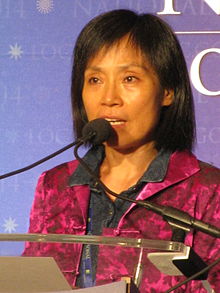Anchee Min
Anchee Min | |
|---|---|
 | |
| Born | January 14, 1957 Shanghai, China |
| Citizenship | American |
| Alma mater | School of the Art Institute of Chicago |
| Occupation | Author |
| Children | Lauryann Jiang |
| Website | ancheemin |
Anchee Min or Min Anqi (Chinese: 閔安琪; pinyin: Mǐn Ānqí; born January 14, 1957, in Shanghai, China) is a Chinese-American author who lives in San Francisco and Shanghai. Min has published two memoirs, Red Azalea and , and six historical novels. Her fiction emphasizes strong female characters, such as Jiang Qing, the wife of chairman Mao Zedong, and Empress Dowager Cixi, the last ruling empress of China.
Life[]
Min was born in Shanghai on January 14, 1957. Her parents were both teachers.[1] She was nine years old when the Cultural Revolution began.[2] As a child, she was a member of the Little Red Guards and was made to report her favourite teacher, who was accused of being an anti-Maoist, to the authorities.[2]
When Min was 17, she was sent to a collective farm[3] near the East China Sea, where she endured horrific conditions and worked 18-hour days.[2] Eventually, she suffered a spinal cord injury.[2] She began an affair with the commander at her camp, a woman named Yin, although she attributes the affair largely to loneliness.
At the collective farm, Min was discovered by a team of talent scouts from the Shanghai Film Studio and was selected to become an actress for her ideal "proletarian good looks."[4] She eventually won the lead role in a propaganda film inspired by Madame Mao.[4] However, the film was never completed.[4] After Mao Zedong's death and the subsequent fall of Jiang Qing,[4] Min was ostracized and treated badly. She was depressed and considered suicide.[4] With the assistance of her friend, American actress Joan Chen, and the sponsorship of her aunt living in Singapore, Min obtained a passport and applied to the School of the Art Institute of Chicago.[4] She then emigrated to the United States. As she was initially entering the country, she was nearly deported when it was discovered that, contrary to what she had put on her visa application, she did not speak English. However, she was able to convince the immigration officer to allow her to enter into the country.[5]
After moving to the US, Min worked five jobs at the same time[2][6] and learned English by watching Sesame Street.[2][7]
Min's first husband was a Chinese artist named Qigu. Together they had a daughter, Lauryann (who attends Stanford University[8]). According to Min herself, she "lured [Qigu] into marriage, making herself pregnant by him although she knew he did not want a child" and subsequently their marriage fell apart.[2] Her second marriage was to author .[9]
Min graduated from the School of the Art Institute of Chicago with a B.F.A. and M.F.A. in Fine Arts.[10]
Bibliography[]
Memoirs[]
- Red Azalea (Pantheon Books, 1994, ISBN 9780679423324; a The New York Times Notable Book); Random House Digital, Inc., 2011, ISBN 9780307781024
- The Cooked Seed: A Memoir. Bloomsbury USA, May 7, 2013, ISBN 978-1-59691-698-2
Fiction[]
- Katherine Hamish Hamilton, 1995, ISBN 978-0-241-13541-9
- Becoming Madame Mao (Boston, Mass.: Houghton Mifflin. ISBN 0-618-12700-3.). Based on the life of Jiang Qing, the last wife of Mao Zedong.
- Wild Ginger: A Novel. Houghton Mifflin Harcourt. January 1, 2004. ISBN 978-0-547-34937-4. Retrieved June 8, 2013.
- Empress Orchid Bloomsbury Publishing Incorporated, 2004, ISBN 9780747566984
- The Last Empress (Bloomsbury Publishing Plc, 2007, ISBN 9780747578505). Based on the life of Empress Dowager Cixi, the late 19th and early 20th century Qing dynasty Empress Dowager.
- Pearl of China: A Novel. Bloomsbury Publishing, April 9, 2010, ISBN 978-1-60819-151-2. Inspired by the life of Pearl S. Buck as a girl and young woman in China.
References[]
- ^ McAlpin, Heller (May 9, 2013). "'The Cooked Seed' details Anchee Min's fraught immigrant saga". Los Angeles Times. ISSN 0458-3035. Retrieved April 10, 2016.
- ^ Jump up to: a b c d e f g "Anchee Min: 'If I had stayed in China, I would be dead'". Telegraph.co.uk. Retrieved April 10, 2016.
- ^ McAlpin, Heller (May 9, 2013). "'The Cooked Seed' details Anchee Min's fraught immigrant saga". Los Angeles Times. ISSN 0458-3035. Retrieved May 25, 2016.
- ^ Jump up to: a b c d e f Scott, A. O. (June 18, 2000). "The Re-education of Anchee Min". The New York Times. ISSN 0362-4331. Retrieved April 10, 2016.
- ^ Bertodano, Helena de (July 4, 2013). "Anchee Min: 'If I had stayed in China, I would be dead'". The Daily Telegraph. ISSN 0307-1235. Retrieved April 23, 2018.
- ^ "An Evening with Anchee Min - National Writers Series". National Writers Series. Retrieved May 25, 2016.
- ^ "A 'Cooked Seed' Sprouts After All, In America". NPR.org. Retrieved May 25, 2016.
- ^ "Overcoming Odds, Author's Success & Daughter's Talents Forged 'Self Worth'". Asia Society. Archived from the original on April 20, 2016. Retrieved April 10, 2016.
- ^ http://nationalwritersseries.org/programs/an-evening-with-anchee-min/
- ^ "Anchee Min". Voices from the Gaps. University of Minnesota. Retrieved June 8, 2013.
External links[]
| Wikiquote has quotations related to: Anchee Min |
- Official website
- "Prairie Lights Books, Iowa City, Iowa, April 2010 interview audio file". Archived from the original on June 22, 2010. Retrieved May 20, 2010.
- "Powell's Books Author Interviews: Anchee Min". Archived from the original on March 18, 2008. Retrieved March 29, 2008.
- Wang, Annie (1999). "Anchee Min's Passionate World".
- 1957 births
- Living people
- American writers of Chinese descent
- Chinese historical novelists
- Actresses from Shanghai
- Writers from Shanghai
- Chinese emigrants to the United States
- Chinese women writers
- American women writers
- School of the Art Institute of Chicago alumni
- Red Guards